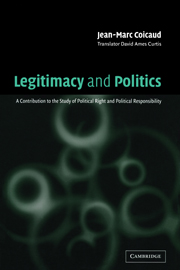Book contents
- Frontmatter
- Contents
- Translator's foreword
- Acknowledgements
- Introduction
- 1 What is political legitimacy?
- 2 Controversies around political legitimacy
- 3 Modernity, rationality of the social sciences, and legitimacy
- 4 Social sciences, historicity, and truth
- 5 Study of politics, relation to history, and de jure judgement
- 6 Community experience, dynamic of possibilities, and political legitimacy
- Conclusion
- Bibliography
- Index
5 - Study of politics, relation to history, and de jure judgement
Published online by Cambridge University Press: 22 September 2009
- Frontmatter
- Contents
- Translator's foreword
- Acknowledgements
- Introduction
- 1 What is political legitimacy?
- 2 Controversies around political legitimacy
- 3 Modernity, rationality of the social sciences, and legitimacy
- 4 Social sciences, historicity, and truth
- 5 Study of politics, relation to history, and de jure judgement
- 6 Community experience, dynamic of possibilities, and political legitimacy
- Conclusion
- Bibliography
- Index
Summary
The analysis of the historicity of social phenomena and of its implications on the practical level is condemned neither to axiological neutrality nor to a dogmatic or disenchanted conception of history. There exists an alternative to these approaches and to the difficulties these approaches generate.
This alternative constitutes a path for research that allows one to establish limits on what is politically acceptable and what is not, amidst a history inhabited by the recognition that change occurs and that there is a plurality of value systems. It allows one to shield the thematic of legitimacy from the aporias to which it is exposed by a consciousness of modernity that is impotent to offer a solution to the problem of good government, even though it places that problem at the centre of its concerns.
This alternative – which does not rule out preserving some of the previously mentioned methodological characteristics of studies of societal phenomena – must articulate an analysis of politics and of the historical field that develops in two complementary directions. First, the utility of an empirical approach to social facts that is designed to elucidate what is politically just remains indissociable from a rehabilitation of the axiological dimension. Second, the alternative envisaged here presupposes a clarification of the relation the analysis of politics has to forms of social organisation.
- Type
- Chapter
- Information
- Legitimacy and PoliticsA Contribution to the Study of Political Right and Political Responsibility, pp. 181 - 204Publisher: Cambridge University PressPrint publication year: 2002



